《新思维英语阅读Ⅲ》教学辅导(第4章)
考研英语阅读新思维:4 第四节 名词+现在分词结构
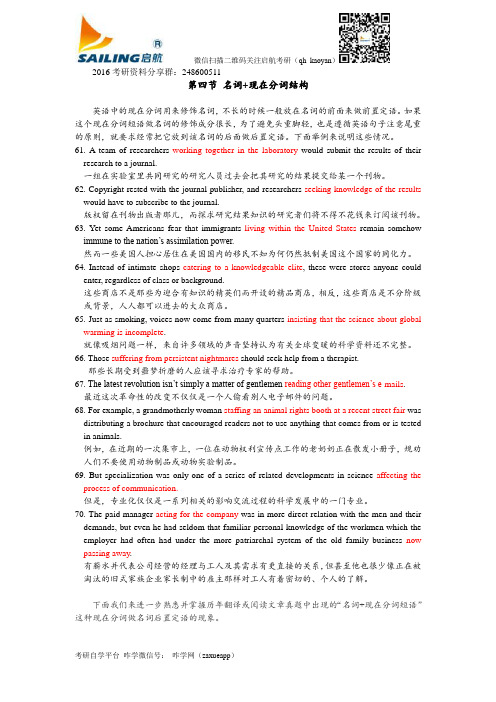
2016考研资料分享群:248600511第四节名词+现在分词结构英语中的现在分词用来修饰名词,不长的时候一般放在名词的前面来做前置定语。
如果这个现在分词短语做名词的修饰成分很长,为了避免头重脚轻,也是遵循英语句子注意尾重的原则,就要求经常把它放到该名词的后面做后置定语。
下面举例来说明这些情况。
61. A team of researchers working together in the laboratory would submit the results of their research to a journal.一组在实验室里共同研究的研究人员过去会把其研究的结果提交给某一个刊物。
62. Copyright rested with the journal publisher, and researchers seeking knowledge of the results would have to subscribe to the journal.版权留在刊物出版者那儿,而探求研究结果知识的研究者们将不得不花钱来订阅该刊物。
63. Yet some Americans fear that immigrants living within the United States remain somehow immune to the nation’s assimilation power.然而一些美国人担心居住在美国国内的移民不知为何仍然抵制美国这个国家的同化力。
64. Instead of intimate shops catering to a knowledgeable elite, these were stores anyone could enter, regardless of class or background.这些商店不是那些为迎合有知识的精英们而开设的精品商店,相反,这些商店是不分阶级或背景,人人都可以进去的大众商店。
《新思维英语阅读Ⅲ》教学辅导(第2章)

《新思维英语阅读Ⅲ》教学辅导(第2章)CHAPTER 2GENDER ROLESTheme Introduction:Most of us would agree that men and women are different, but we disagree about exactly how and why they are different. The differences sometimes cause problems in family and social systems. In this chapter you will look at the question of gender roles, the roles we take in our family and at work according to our gender. Are these gender roles natural or created by society? Do different societies have different gender roles? And how are gender roles changing in today's world?Reading Skill Practised: Predicting and SurveyingGood readers can predict the content of what they will read, that is, they can guess the general ideas before they read. Do they have special magic powers? Probably not! They have simply learned to skim the title, headings, photos, etc. in order to gather a little information before reading. Skimming something in order to make predictions is called "surveying". Surveying a reading passage, a chapter, and a textbook before reading it helps the reader to make a mental map, and to read more quickly and accurately.Reading Skill (1): PredictingPredicting means to guess something, based on some information. Weathermen predict the weather, using clues and information. Research shows that readers who are skillful at predicting information, read more quickly and accurately. You can predict the content of the article, before you read it, by skimming. One reason to skim an article is to predict the general idea and the basic content.One way to use prediction in your reading is to make questions before you read. Asking your own pre-reading questions makes you an active reader. Another way to make predictions is to use your own background knowledge (what you already know) to imagine what the writer will say.Practice (Take Reading One as an Example)1. What do you want to know about gender differences? Write down two questions.2. Skim the article again, noticing the headings. From your own knowledge of gender differences, write down any facts you already know about the topics of these headings.Reading Skill (2): Surveying an ArticleBefore reading "A Women's World" (Reading Two), take about one minute to survey it. Surveying is skimming something in order to make predictions. Here are the steps for surveying an article: 1. Check to see how long the passage is. About how long will it take you to read it once? _______ words _________ minutes2. Skim (let your eyes move through the passage) and underline the following:titlefirst sentencelast sentence3. Skim the article very quickly, circling any subtitles, boldface or italicized words, special punctuation.4. Underline the first sentence in each paragraph. Skim those sentences only. Now try to predict the content. From your prediction, which of the following best describes the content of the reading? Tick your choice.___ The problems with the matriarchal system of the Khasi tribe___ The good points of the matriarchal system of the Khasi tribe___ The differences between boys and girls in the Khasi tribe5. Part of surveying a passage is active questioning. Good readers predict the content by making questions. What do you want to know about this topic? Write down two questions.Reading Skill (3): Surveying Your TextbookAs you have learned, to survey means to skim before reading, in order to make predictions about the general content. This is helpful in understanding a reading passage. It is also useful to survey your textbook when you start a new course. Take about 10 minutes now to survey your textbook, answering the following questions. Remember to use your skimming skills:1. Name of textbook:2. Skim the table of contentsHow many chapters are there?How many readings in each chapter?Which chapter titles catch your eye?3. Skim the Preface or Introduction. What is the purpose of this textbook? What is the most interesting thing that you read in the preface?4. Check the back of the book to see what is there. Mark an x beside any of these study aids you find:____ Answer Key____ References /Bibliography____ Glossary____ Index5. Write 3 sentences describing the contents of this textbook to someone who has never seen it.Rending Skill (4): Surveying a ChapterThe purpose of surveying a chapter is to see how the chapter is organized. If you survey the chapter before you start to read it, you will have a helpful map in your mind of the general content. This will help you to read more quickly and accurately.Steps for Surveying a Textbook Chapter:●Check the length of the chapter and decide whether or not you have time to read it all, or ifyou should divide it into two or more reading sessions.●Read the chapter title and subtitles, and ask yourself what you already know about it.●Look at any pictures, diagrams, or other visual aids.●Read the introduction to the theme and reading skill.Such a survey can help you predict the chapter's content, help you get your mind on the topic, and help you judge the time you will need to complete the chapter. The questions which you ask after surveying will give you a personal purpose for reading and help you keep your focus on the topic.Main Idea of Reading Materials:Reading One:本文通过对比的方式揭示了男性与女性在生理上以及在社会环境中体现出来的性别差异。
《新思维英语阅读》教学辅导(第5章)

《新思维英语阅读》教学辅导(第5章)《新思维英语阅读Ⅲ》教学辅导(第5章)CHAPTER 5 AGINGTheme Introduction:The search for the secret to long life has existed since time began. We all want a long, healthy life. We notice the signs of our own aging with concern. Why do we age? While medical science, and individuals consider ways to prolong human lifespan, the numbers of people over 60 — and particularly those over 80 — are growing fast. This rapid aging of global society brings many problems.Reading Skill Practised: Word AnalysisAs you learned in Chapter 4, learning to read without constant use of your dictionary will help you become a faster and more efficient reader. However, sometimes the context of the sentence does not give enough information for you to guess the meaning of unknown words. Another vocabulary strategy you can try is word analysis. In word analysis, the reader breaks down English words into common parts and guesses the meaning from the word origin.Reading Skill: Word Analysis (Prefixes)Sometimes the context of the sentence does not give enough information for you to guess the meaning of the unknown word. If that is the case, and you feel you need to know that unknown word's meaning to understand the sentence, then you should open your dictionary. However, there is another vocabulary strategy you might try: Word analysis. In word analysis, the reader breaks down English words into prefix (the beginning of the word), root (the middle of the word, and its basic meaning), and suffix(the end of the word). An example is the word international, which canbe broken down like this:Prefix Root Suffix inter nation al(between) (nat = to be born. Nation means literally\ (about, away of being)a group of people born together\and has come to mean a country.)International is about the relations or exchanges between two or morecountriesYou can use this strategy of word analysis to guess the meaning of theword. Especially if there is some contextual information in the sentenceor paragraph, word analysis can be quite useful.Here is a partial list of common prefixes.Prefix Meaning Example ad-, af- move towards advance anti- against anti-agingauto- self automobile bi- two biannual con-, corn-, co- with conversation en- to giveenlighten de- away from, down decreasehyper- over hyperactive inter-,intra- between, among, within international mini- small minibus maxi- large maximum mis- wronglymisunderstand mono- onemonologue poly- manypolytechnic pre- beforepreview pro- forwards, forth promotesub- under substandard super- above supernatural tele- far telephone trans- acrosstranslateultra- extremeultraconservativeun-, in-, im- negative, not unhelpful,impolite, illegalReading Skill: Word Analysis (Roots)Roots carry the basic meaning of the word. The meaning of the roots canbe changed by adding prefixes or suffixes. Here is a partial list of commonroots. Root Meaning Example aud hear auditorium bio life biosphere diet speak, word predictduct to lead conduct ferto bring, carry transfer firm to makestrong confirm gen(e) to create, make generate homo the same homogeneoushetero different heterosexualhydro water hydro-electric ject to throw objectlogy the study of psychology man hand manual mar sea marine mov, mot, mob to move motivate mort dead mortal port to carry portable psych mental, brainpsychologist serv to protect, to keepservantspect to look at spectatorstruct to build construct vis,vid to see, sight videoReading Skill: Word Analysis SuffixBy adding a suffix after the root, we can change the meaning of the word.Here is a partial list of common suffixes. Also added is the word form:adjective (adj): noun (n); adverb (adv).Suffix Meaning Example -ar of, for popular -able.-ible (adj)ability to lovable -er, -or, -ist (n) aperson who biologist-er, -est (adj) more, most shorter,shortest -ful (adj) full ofbeautiful -hood (n) state of beingmotherhood -ic, -al (adj) made of, about,internationalway of being-ious (adj) full of curious -ish(adj) like, similar to childish -ity (n) state of being dignity -ive (adj)causing, making active -ly (adv) in themanner of quietly -less (adj) without worthless -ness (n) state of beingkindness -some (adj) full of, causingtiresomeMain Idea of Reading Materials:Reading One:本文首先指出:人口老龄化问题已成为全世界面临的第一大问题,中国社会也同样面临老龄化危机的挑战;接着分析了老龄化危机的原因,随之在一系列解决方法中提出关怀老年人的一些措施。
新思维英语阅读PPT课件

CHAPTER 10 RURAL AND URBANLIFE
Business
Chapter 2 GENDER ROLES
• Reading 1 Gender Differences • Reading 2 A Women’s World • Reading 3 Men’s Liberation • Reading 4 Gender Stereotypes in Chinese
• Reading 1 Nothing Wasted, Everything Gained
• Reading 2 Man and Nature Coexist • Reading 3 City on the Sea • Reading 4 The Most Innovative City
CHAPTER 11 THE ARTS
新思维英语阅读 III
• CHAPTER I COMMUNICATION STYLES • CHAPTER 2 GENDER ROLES • CHAPTER 3 EDUCATIONAL REFORM • CHAPTER 4 LIFESTYLES • CHAPTER 5 AGING • CHAPTER 6 BILDIVERSITY (REVIEW)
Education
CHAPTER 4 LIFESTYLES
• Reading 1 The Good Life • Reading 2 New Lifestyle in China • Reading 3 Searching for Utopia • Reading 4 Timeshifting: An Interview with r.
新思维综合英语3课程辅导Unit31115
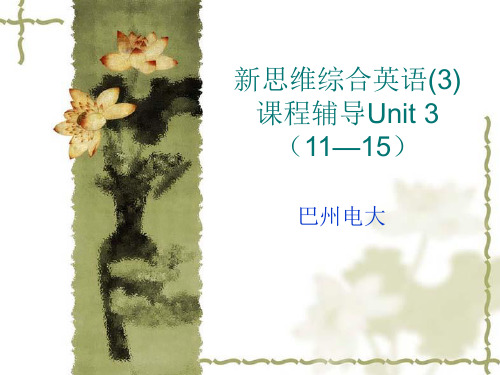
第二段即第三自然段,总体概述了皇家贵族都有饲养珍奇动 物为宠物的嗜好。 Henry was not the first king to keep large pets. Henry 三世 并不是第一个饲养巨大充物的国王。 The + 序数词 (+ 名词) + do do sth,第几(多少)个做某事 的…… keep pets 饲养充物。 Animals of great beauty, 即下文中提到的 the biggest, the strongest, and the most dangerous animals. 可见旧时上层 社会盛行的穷奢极侈的生活方式。 第三段即第四~八自然段,分别介绍了世界其他国家达官贵 族饲养各种珍奇动物为宠物的情况。
第四自然段的第一句话就是本段的主题句 Both the ancient Egyptians and Chinese collected animals for pleasure. 紧接着扩展句以并列句的形式说明了古代埃及皇 家和中国皇帝们饲养动物的情况。 Parks of intelligence, 智慧园,逸智园。Royal, 皇家的,皇 室的。Royalty, 名词,皇室,皇家。 第五自然段介绍意大利帝王饲养鸟类的爱好。Birds, exotic or familiar, were popular in Rome. 在罗马,无论是希 奇古怪的还是人们熟悉的鸟都曾经是很盛行的。
四、理解段落或句子深层含义的技巧
理解段落或句子的深层含义与归纳段落的大意有所不同。 归纳段落大意使用的是总结概括的方法,而理解段落或句子 的深层含义运用的则是分析文字语义的方法。也就是说,透 过字面意思去看深层含义,需要从单词、短语、 英语阅读 是一项复杂的脑力劳动,它需要阅读技巧,而任何技巧都是 建立在厚实的语言知识、广泛的文化知识、较强的鉴赏能力 以及积极的阅读态度之上的,因此,在注重技巧的同时,千 万别忘记打好坚实的语言和知识基础。
大学英语新思维XSW_B1U4-U6辅学
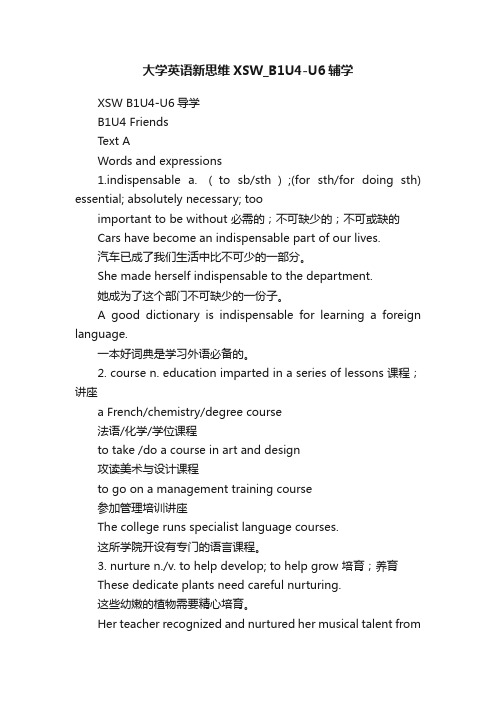
大学英语新思维XSW_B1U4-U6辅学XSW B1U4-U6导学B1U4 FriendsText AWords and expressions1.indispensable a. (to sb/sth);(for sth/for doing sth) essential; absolutely necessary; tooimportant to be without 必需的;不可缺少的;不可或缺的Cars have become an indispensable part of our lives.汽车已成了我们生活中比不可少的一部分。
She made herself indispensable to the department.她成为了这个部门不可缺少的一份子。
A good dictionary is indispensable for learning a foreign language.一本好词典是学习外语必备的。
2. course n. education imparted in a series of lessons 课程;讲座a French/chemistry/degree course法语/化学/学位课程to take /do a course in art and design攻读美术与设计课程to go on a management training course参加管理培训讲座The college runs specialist language courses.这所学院开设有专门的语言课程。
3. nurture n./v. to help develop; to help grow 培育;养育These dedicate plants need careful nurturing.这些幼嫩的植物需要精心培育。
Her teacher recognized and nurtured her musical talent froman early age.她的老师在她很小的时候就认识到她的音乐才能并加以培养。
《新目标英语第三册第四单元阅读部...
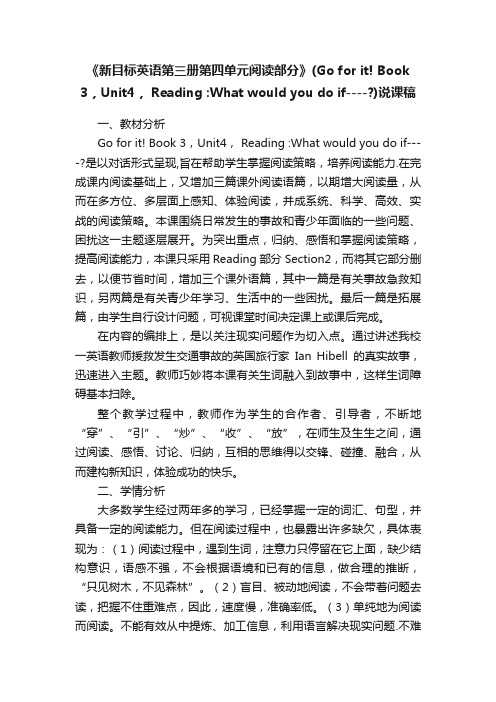
《新目标英语第三册第四单元阅读部分》(Go for it! Book 3,Unit4, Reading :What would you do if----?)说课稿一、教材分析Go for it! Book 3,Unit4, Reading :What would you do if----?是以对话形式呈现,旨在帮助学生掌握阅读策略,培养阅读能力.在完成课内阅读基础上,又增加三篇课外阅读语篇,以期增大阅读量,从而在多方位、多层面上感知、体验阅读,并成系统、科学、高效、实战的阅读策略。
本课围绕日常发生的事故和青少年面临的一些问题、困扰这一主题逐层展开。
为突出重点,归纳、感悟和掌握阅读策略,提高阅读能力,本课只采用Reading部分Section2,而将其它部分删去,以便节省时间,增加三个课外语篇,其中一篇是有关事故急救知识,另两篇是有关青少年学习、生活中的一些困扰。
最后一篇是拓展篇,由学生自行设计问题,可视课堂时间决定课上或课后完成。
在内容的编排上,是以关注现实问题作为切入点。
通过讲述我校一英语教师援救发生交通事故的英国旅行家Ian Hibell的真实故事,迅速进入主题。
教师巧妙将本课有关生词融入到故事中,这样生词障碍基本扫除。
整个教学过程中,教师作为学生的合作者、引导者,不断地“穿”、“引”、“炒”、“收”、“放”,在师生及生生之间,通过阅读、感悟、讨论、归纳,互相的思维得以交锋、碰撞、融合,从而建构新知识,体验成功的快乐。
二、学情分析大多数学生经过两年多的学习,已经掌握一定的词汇、句型,并具备一定的阅读能力。
但在阅读过程中,也暴露出许多缺欠,具体表现为:(1)阅读过程中,遇到生词,注意力只停留在它上面,缺少结构意识,语感不强,不会根据语境和已有的信息,做合理的推断,“只见树木,不见森林”。
(2)盲目、被动地阅读,不会带着问题去读,把握不住重难点,因此,速度慢,准确率低。
(3)单纯地为阅读而阅读。
思维综合英语3课程辅导U(4)
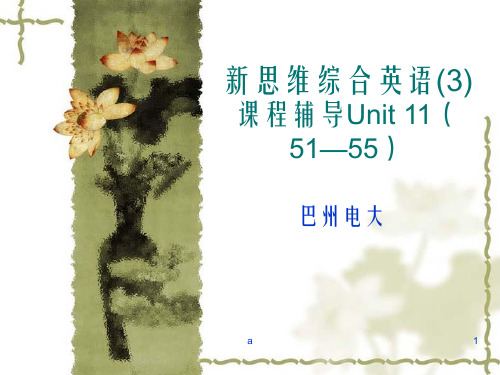
a
13
❖ 问题五:Why does being in love make everything in life seem wonderful? 为什么恋爱让生活中方方面面看起来那么 美好?
never had a chance to get used to each other.
a
12
❖ 2. to have a chance to do sth.,“有机会做某事”。 chance还可以表示“几率,可能性”,往往指好的事情实现 的可能性。如:Is there any chance of you having a holiday this year? 你今年有没有放假的可能?
a
4
Focus Questions
❖ 1. What is Dr. Liebowitz’s ‘neurochemical theory of romance’?
❖ 2. What is the basis for romantic attachment? ❖ 3. Why do people become tired of each other?4. How’s
8
❖ 3. to stop to do sth.,“停下来去做某事”,区别于to stop doing sth.,“停止做某事”。
❖ 如:He stopped writing and began to think about his future. 他停止了写信,开始想他的将来。
❖ He stopped to think about his future. 他停下来,转而去想 他的将来。
❖ to fall in love,“产生爱意”。
新思维大学英语阅读教程4答案上海交通大学

新思维大学英语阅读教程4答案上海交通大学1、If people _____ overanxious about remembering something, they will forget it. [单选题] *A. will beB. would beC. wereD. are(正确答案)2、The trouble turned out to have nothing to do with them. [单选题] *A. 由…引发的B. 与…有牵连C. 给…带来麻烦D. 与…不相干(正确答案)3、The bookstore is far away. You’d better _______ the subway. [单选题] *A. sitB. take(正确答案)C. missD. get4、27.My father is a professor and he works in__________ university. [单选题] * A.a (正确答案)B.anC./D.the5、The red jacket is _______ than the green one. [单选题] *A. cheapB. cheapestC. cheaper(正确答案)D. more cheap6、_____ rooms are both large and comfortable. [单选题] *A. Jack's and Jane's(正确答案)B. Jack and Jane'sC. Jack's and JaneD.Jack and Jane7、Ships can carry more goods than _____ means of transport. [单选题] *A. the otherB. anotherC. any other(正确答案)D. any8、74.No person ()carry a mobile phone into the examination room during the national college Entrance Examinations.[单选题] *A.shall(正确答案)B.mustC.canD.need9、David ______ at home when I called at seven o’clock yesterday evening. ()[单选题] *A. didn’tB. doesn’tC. wasn’t(正确答案)D. isn’t10、John will go home as soon as he _______ his work. [单选题] *A. finishB. will finishC. finishedD. finishes(正确答案)11、31.That's ______ interesting football game. We are all excited. [单选题] * A.aB.an(正确答案)C.theD./12、()late for the meeting again, Jack! 一Sorry, I won t. [单选题] *A.Don’tB. Be notC.Don't be(正确答案)D.Not be13、41.—________ do you take?—Small, please. [单选题] *A.What size(正确答案)B.What colourC.How manyD.How much14、The train is coming. Be ______! [单选题] *A. careful(正确答案)B. carefullyC. carelessD. care15、This year our school is _____ than it was last year. [单选题] *A. much more beautiful(正确答案)B. much beautifulC. the most beautifulD. beautiful16、Tom didn’t _______ his exam again. It was a pity. [单选题] *A. winB. pass(正确答案)C. beatD. Fail17、Have you done something _______ on the weekends? [单选题] *A. special(正确答案)B. soreC. convenientD. slim18、It is reported()three people were badly injured in the traffic accident. [单选题] *A. whichB. that(正确答案)C.whileD.what19、He doesn’t feel well. He has a _______ nose. [单选题] *A. runingB. rainingC. runny(正确答案)D. rainy20、---Excuse me sir, where is Room 301?---Just a minute. I’ll have Bob ____you to your room. [单选题] *A. show(正确答案)B. showsC. to showD. showing21、38.—Do you have ________else to say for your mistake?—________but sorry. [单选题] *A.anything; SomethingB.something; EverythingC.anything; Nothing(正确答案)D.something; Anything22、_______ your help, I can’t finish my job. [单选题] *A. withB. without(正确答案)C. inD. into23、Finally,I have _____ interesting to share with you,and I am sure you will be interested in it. [单选题] *A. everythingB. something(正确答案)C. nothingD. anything24、--Jenny, what’s your favorite _______?? ? ? --like peaches best. [单选题] *A. fruit(正确答案)B. vegetablesC. drinkD. plants25、7.—I've got some ________.—Great! I'd like to write with it. [单选题] * A.funB.chalk(正确答案)C.waterD.time26、We _____ three major snowstorms so far this winter. [单选题] *A.hadB. haveC. have had(正确答案)D.had had27、I hope to see you again _______. [单选题] *A. long long agoB. long beforeC. before long(正确答案)D. long28、Your father is very busy, so he ______ play football with you this afternoon.()[单选题] *A. doesn’tB. don’tC. isn’tD. won’t(正确答案)29、Chinese people spend _____ money on travelling today as they did ten years ago. [单选题] *A. more than twiceB. as twice muchC. twice as much(正确答案)D. twice more than30、While studying abroad, he financially depended()his wife. [单选题] *A. on(正确答案)B. ofC. toD. from。
新思维英语阅读ppt课件

Control groups
(实验)对照组
25
Communication habits 交际习惯 Show up 显现出来 Power balance 权利平衡 Gender difference 性别差异 Wicked Witch 邪恶的女巫 Give away 让出;放弃 The stereotyped role 传统的角色;固定沿
Schools
6
Chatper 3 EDUCATIONAL REFORM
Reading 1 Voices from the Classroom Reading 2 Montessori, Alternative School Reading 3 Education for the 21st Century Reading 4 Reforming China’s Higher
9
CHAPTER 6 BIODIVERSITY
Reading 1 The Value of Biodiversity Reading 2 Biodiversity Loss Reading 3 Biodiversity in China Reading 4 Diversity in Diet Helps Preserve
Reading 1 Technology: Are You Ready? Reading 2 The Technology Buyer’s Guide Reading 3 China Goes Online Reading 4 Data on Ocean Floors
13
CHAPTER 10 RURAL AND URBANLIFE
Theraphy
21
CHAPTER 18 POPULATION
新思维综合英语3课程辅导Unit555-25页精选文档
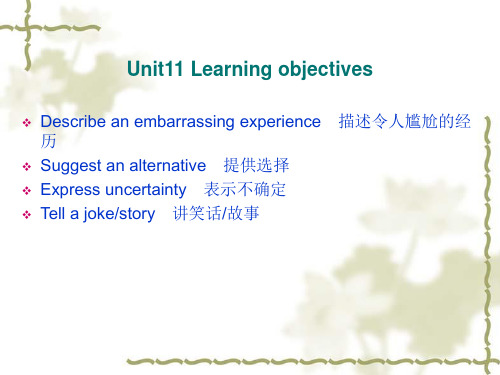
❖ to fall in love,“产生爱意”。
❖ 这是一个被动句,be influenced by sth.。
❖ 被动句的结构是:主语(动作承受者)+ 助动词be + 动词的过去分词 (+ by + 动作发出者),如:The leader was supported by his people. 人们拥护他们的领袖。
She found it difficult to meet the deadline. 她觉得要在 规定日期前完成任务很困难。
The captain found it necessary to send an SOS signal. 船长察觉到必须发出求救信号。 2. to reduce … to …,“把……降低(贬斥)为……”。如: The emperor reduced the officer to a beggar. 皇帝把这个官 员贬为乞丐。
Focus Questions
❖ 1. What is Dr. Liebowitz’s ‘neurochemical theory of romance’?
❖ 2. What is the basis for romantic attachment? ❖ 3. Why do people become tired of each other?4. How’s
Unit11 Learning objectives
❖ Describe an embarrassing experience 历
❖ Suggest an alternative 提供选择 ❖ Express uncertainty 表示不确定 ❖ Tell a joke/story 讲笑话/故事
描述令人尴尬的经
职业高中英语第三册第四单元阅读部分教案unit4readingandwriting

职业高中英语第三册第四单元阅读部分教案unit4readingandwriting汨罗市职业中专学校教学方案设计(首页)教学内容Book3 Unit4 I’ll have tohave my watch replacedReading andwriting(PPT16-28)课型学时节次授课班级授课日期出勤情况纪律情况教学目的知识与技能过程与方法情感态度价值观语言技能目标:听—能够顾客投诉时描述的问题和对问题处理的需求。
说—能够使用典型的句子等描述问题并寻求解决方法。
读—能读懂投诉及处理投诉的信件,能从信件中提取对问题的解决办法。
写—能回复顾客的投诉信学生能在学习中发现问题和解决问题1、小组合作法2、情景教学法3、游戏教学法4、探索发现法文化意识:掌握在工作中遇到投诉时的合理处理方式。
情感态度:学生具备初步的服务意识,能够以专业的方法对待顾客投诉。
教学重点能够听懂顾客投诉时描述的问题和对问题处理的需求。
能够使用正确的句子等描述问题并寻求解决方法教学难点能理解because,since,as,for引导从句和so that 引导从句在句子中不同作用。
能使用because,since,as,for,so that 表达原因和结果教学资源多媒体教学后记Step 1 Review1.请学生在默写上节课所学习的单词。
2.请几组学生表演Activity 6的对话3.检查学生完成Activity 8的练习作业。
Step 2 Lead—inEveryday EnglishIt’s not what you promised. 这与你们承诺的不一致。
How do you expect us to solve the problem?您希望如何解决呢?Can you provide …?您能提供?吗?Contact us again if you have any other problems. 如再有问题请与我们联系。
大学英语精读第三册教案四单元Unit4AFansNotes
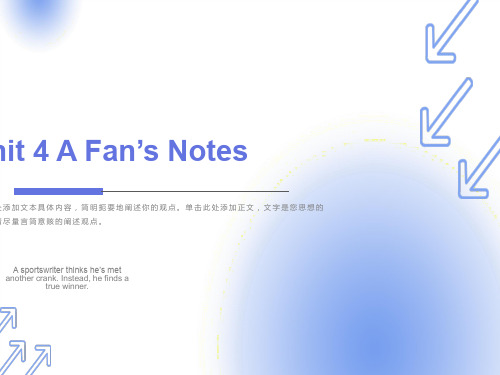
That proved it. Who, in her supposed condition, could cover … On a winding dirt road dotted with potholes the size of small animals … On the desk was a computer. Next to it was a TV. Sarah leaned over the computer. I had contacted Sarah looking for a fight? I had found that fight. (Note 9) Sarah had brought me back. (Note 10)
2.Global analysis
Part division
Main Ideas
Paras
Parts
1
1-4
2
5-29
3
30-44
The start of our unusual relationship
The development via more email exchanges
The real-life contact
Homework
Reading Skill
Sentence Structure
Text Interpretation
Guided Writing
Translation Practice
Word Family
Useful Expressions
Unit 4 A Fan’s Notes
Useful Expressions
Reading Skill
Reading Plus Ⅲ新思维英语阅读Ⅲ--领悟阅读汇总
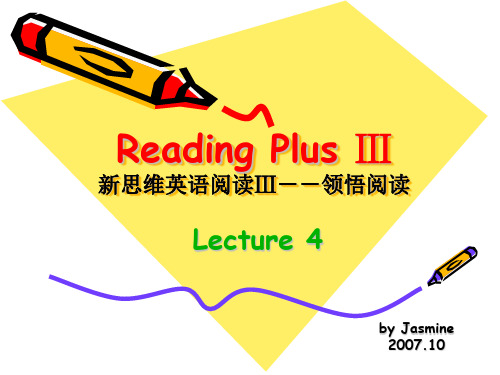
•
listing
•
sequence •
comparison and contrast
•
combination of patterns
Conclusion
Here are some of the signal words you may come across when you read a text that is organized around listing:
•
the main several numerous
one many first
another in addition second
Reading Skill Review
Chapter 7 Topic and Main Idea
Chapter 8 Recognizing Parts of the Supporting Paragraph Chapter 9 Scanning
Topic and Main Idea
主题与中心思想 • --Step 1: to identify the topic • To remember: Topics are expressed in words or phrases, never in sentences. • --Step 2: to look for the main idea • To remember: You can find the main idea of most reading passages by examining the last sentence of the introduction. But pay attention to the implied main idea.
新思维英语阅读(III)指导
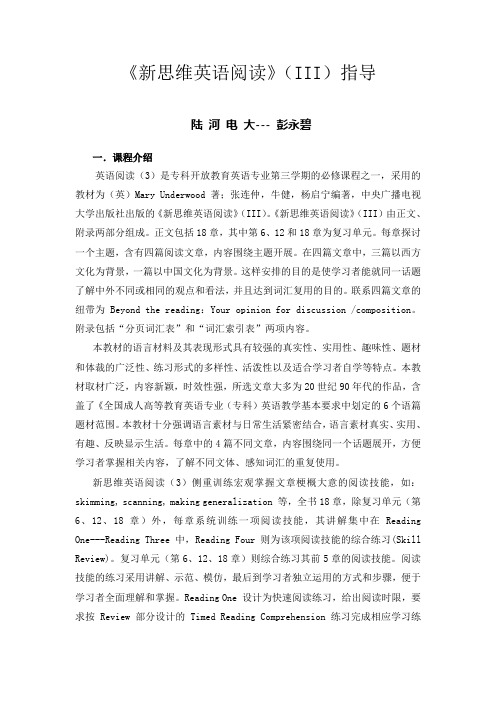
《新思维英语阅读》(III)指导陆河电大--- 彭永碧一.课程介绍英语阅读(3)是专科开放教育英语专业第三学期的必修课程之一,采用的教材为(英)Mary Underwood著;张连仲,牛健,杨启宁编著,中央广播电视大学出版社出版的《新思维英语阅读》(III)。
《新思维英语阅读》(III)由正文、附录两部分组成。
正文包括18章,其中第6、12和18章为复习单元。
每章探讨一个主题,含有四篇阅读文章,内容围绕主题开展。
在四篇文章中,三篇以西方文化为背景,一篇以中国文化为背景。
这样安排的目的是使学习者能就同一话题了解中外不同或相同的观点和看法,并且达到词汇复用的目的。
联系四篇文章的纽带为Beyond the reading:Your opinion for discussion /composition。
附录包括“分页词汇表”和“词汇索引表”两项内容。
本教材的语言材料及其表现形式具有较强的真实性、实用性、趣味性、题材和体裁的广泛性、练习形式的多样性、活泼性以及适合学习者自学等特点。
本教材取材广泛,内容新颖,时效性强,所选文章大多为20世纪90年代的作品,含盖了《全国成人高等教育英语专业(专科)英语教学基本要求中划定的6个语篇题材范围。
本教材十分强调语言素材与日常生活紧密结合,语言素材真实、实用、有趣、反映显示生活。
每章中的4篇不同文章,内容围绕同一个话题展开,方便学习者掌握相关内容,了解不同文体、感知词汇的重复使用。
新思维英语阅读(3)侧重训练宏观掌握文章梗概大意的阅读技能,如:skimming, scanning, making generalization 等,全书18章,除复习单元(第6、12、18章)外,每章系统训练一项阅读技能,其讲解集中在Reading One---Reading Three中,Reading Four则为该项阅读技能的综合练习(Skill Review)。
复习单元(第6、12、18章)则综合练习其前5章的阅读技能。
新思维综合英语3课程辅导Unit41620

Unit 4 Learning objectives
❖ How to recall the past 如何回忆过去发生的事情 ❖ How to describe the past 如何描述过去发生的事情 ❖ How to talk about how you’ve changed 如何谈论自己发
❖ 240-square-mile, 数量词连用(有时还可以加形容词),中 间有连字符连接,名词用单数。
❖ 又如:a 3-meter-long table, 一张三米长的桌子;a 15storey building, 一座15层的大楼。 Luxury apartment buildings, 豪华住宅楼房。
❖ (3)根据经验和常识猜测词义; 如:Rushing and running on his job all day long, Mr
Lewis’ energy is depleted at the end of the day. 我们知道, 一个人奔忙了一整天的工作,精力肯定是被大大消耗了。所 以,把depleted猜成decreased greatly应该合情合理
❖ Her red straw “fighting hat” firmly in place … 她那顶红色 的“战斗”草帽牢牢地戴在头上。(这里,从一个侧面表现 了这位80多岁高龄的老人保护环境的坚定信念。) 老人开始讲话时,听到台下有人给她起哄,非但没有生气, 而是很巧妙地让他们 Boo louder, 等大家安静下来后,她才 开始讲话
❖ Although the water appears at first still, it actually is part of a river, moving 100 feet a day, a few inches to a few feet deep, and 50 miles wide, flowing from Lake Okeechobee into the Gulf of Florida.
英语ⅲ人教新资料unit4教案
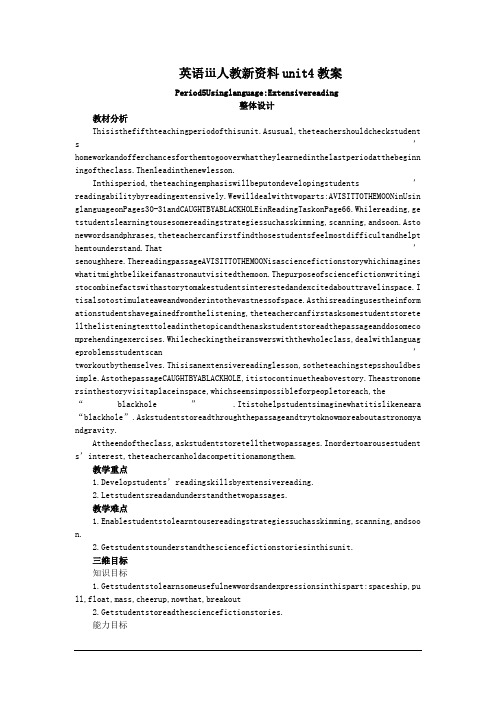
英语ⅲ人教新资料unit4教案Period5Usinglanguage:Extensivereading整体设计教材分析Thisisthefifthteachingperiodofthisunit.Asusual,theteachershouldcheckstudent s’homeworkandofferchancesforthemtogooverwhattheylearnedinthelastperiodatthebeginn ingoftheclass.Thenleadinthenewlesson.Inthisperiod,theteachingemphasiswillbeputondevelopingstudents’readingabilitybyreadingextensively.Wewilldealwithtwoparts:AVISITTOTHEMOONinUsin glanguageonPages30-31andCAUGHTBYABLACKHOLEinReadingTaskonPage66.Whilereading,ge tstudentslearningtousesomereadingstrategiessuchasskimming,scanning,andsoon.Asto newwordsandphrases,theteachercanfirstfindthosestudentsfeelmostdifficultandhelpt hemtounderstand.That’senoughhere.ThereadingpassageAVISITTOTHEMOONisasciencefictionstorywhichimagines whatitmightbelikeifanastronautvisitedthemoon.Thepurposeofsciencefictionwritingi stocombinefactswithastorytomakestudentsinterestedandexcitedabouttravelinspace.I tisalsotostimulateaweandwonderintothevastnessofspace.Asthisreadingusestheinform ationstudentshavegainedfromthelistening,theteachercanfirstasksomestudentstorete llthelisteningtexttoleadinthetopicandthenaskstudentstoreadthepassageanddosomeco mprehendingexercises.Whilecheckingtheiranswerswiththewholeclass,dealwithlanguag eproblemsstudentscan’tworkoutbythemselves.Thisisanextensivereadinglesson,sotheteachingstepsshouldbes imple.AstothepassageCAUGHTBYABLACKHOLE,itistocontinuetheabovestory.Theastronome rsinthestoryvisitaplaceinspace,whichseemsimpossibleforpeopletoreach,the “blackhole”.Itistohelpstudentsimaginewhatitislikeneara “blackhole”.Askstudentstoreadthroughthepassageandtrytoknowmoreaboutastronomya ndgravity.Attheendoftheclass,askstudentstoretellthetwopassages.Inordertoarousestudent s’interest,theteachercanholdacompetitionamongthem.教学重点1.Developstudents’readingskillsbyextensivereading.2.Letstudentsreadandunderstandthetwopassages.教学难点1.Enablestudentstolearntousereadingstrategiessuchasskimming,scanning,andsoo n.2.Getstudentstounderstandthesciencefictionstoriesinthisunit.三维目标知识目标1.Getstudentstolearnsomeusefulnewwordsandexpressionsinthispart:spaceship,pu ll,float,mass,cheerup,nowthat,breakout2.Getstudentstoreadthesciencefictionstories.能力目标1.Developstudents’readingskillsbyextensivereadingandenablethemtolearnhowtousedifferentreadingskil lstoreaddifferentreadingmaterials.2.Havestudentslearntousetheusefulnewwordsandexpressionscorrectly.3.Enablestudentstounderstandthepassagesandknowmoreaboutastronomyandgravity.情感目标1.Stimulatestudents’interestinastronomyandspacetravel.2.Developstudents’senseofgroupcooperationandteamwork.教学过程→Step1Revision1.Checkthehomeworkexercises.2.Asksomepairsofstudentstocometothefrontandactouttheirdialoguetoreviewtheex pressionsofgivinginstructions.3.HavesomestudentstalkaboutIsaacNewton,AlbertEinsteinandStephenHawkingaswel lastheirideasongravity.→Step2WarmingupLetstudentstobrainstormthefollowingquestions:Whatcountryfirstsentpeopleintospace?Howmanycountrieshavesucceededinsendingpeopleintospacesofar?Whofirstlandedonthemoon?WhoisthefirstChineseastronauttogointospace?Doyouwanttovisitthemoon?→Step3Reading1.Askstudentstoreadthepassageandthendescribethethreewaysinwhichgravitychang edforLiYanpingandhowhisweightchanged.1)WritedownthethreewaysinwhichgravitychangedforLiYanping.ThewaygravitychangedLefttheearthInspaceOnthemoonSuggestedanswers:ThewaygravitychangedLefttheearth Thegravitybecameverystrong.Inspace Thegravitydisappeared.Onthemoon Thegravitybecameverylight.2)Hisweightchangedthreetimes,too.Nowwritethemdown.HowhisweightchangedLefttheearthInspaceOnthemoonSuggestedanswers:HowhisweightchangedLefttheearth Hebecameveryheavy.Inspace Hehadnoweightandcouldfloataroundlikeafeather.Onthemoon Hewasaboutone-sixthofhisweightontheearth.2.Askstudentstoreadthepassagealoudtothetapeandunderlinealltheusefulexpressi onsorcollocationsinthepassage.Letstudentsreadthemaloudandcopythemdownintheirexe rcisebookafterclassashomework.Trytokeeptheminmind.Collocations:beluckyenoughtodo,haveachance,makeatripintospace,explainsth.to sb.,theforceofgravity,beoff,thepulloftheearth’sgravity,fallbacktotheearth,falltotheground,toofarfromtheearth,asif,atall,getcl oseto,cheerup,comeon,lessthan,downthesteps,stepforward,twiceasfaras,fallover,ab itof,nowthat,afterawhile,getthehangof,breakout,ontheoutsideof,bepushedinto →Step4Importantlanguagepoints1.Beforeweleft,LiYanpingexplainedtomethattheforceofgravitywouldchangethreet imesonourjourneyandthatthefirstchangewouldbethemostpowerful.在启程往常,李彦平向我解释说,在我们的航行中会有三次引力的改变,而第一次的改变将是最强的。
- 1、下载文档前请自行甄别文档内容的完整性,平台不提供额外的编辑、内容补充、找答案等附加服务。
- 2、"仅部分预览"的文档,不可在线预览部分如存在完整性等问题,可反馈申请退款(可完整预览的文档不适用该条件!)。
- 3、如文档侵犯您的权益,请联系客服反馈,我们会尽快为您处理(人工客服工作时间:9:00-18:30)。
《新思维英语阅读Ⅲ》教学辅导(第4章)CHAPTER 4 LIFESTYLESTheme Introduction:What really makes us happy? Whether we are rich or poor, educated or uneducated, all of us seek some happiness through our lifestyle. For some, it is important to have a fast car, for others, a long yearly holiday, for others, to see their children well-fed and well-educated, and for still others, to sit in the quiet woods away from televisions, telephones and computers. Lifestyles vary depending on culture, age, gender, occupation, etc. In this unit you will read about a variety of lifestyle choices.Reading Skill Practised: Guessing Vocabulary from ContextLearning to guess the meaning of unknown words from the context of the sentence or paragraph will help you become a better reader. This skill can be developed by practising reading without a dictionary, and by paying attention to signal punctuation and signal words which help the reader guess the meaning.Reading Skill: Guessing Meaning from ContextLearning to guess the general meaning of unknown words from the context of the sentence or paragraph will help you become a faster, more effective reader. There is a differenc e between passive and active vocabulary. Y ou do not need active vocabulary to become a good reader. Passive vocabulary includes words that you understand when you read but do not know how to use when you are speaking or writing. For reading, even native language readers are satisfied with passive vocabulary, that is, with a general understanding of the word without knowing its exact definition or shades of meaning. In other words, you do not need to reach for your dictionary to check every unknown word while you are reading. In fact, you should not do this. So put away your dictionary and take out your imagination!Here is an example from the first paragraph of the reading you just completed:Imagine something unhealthy, dangerous and expensive, and you will notice it is often enjoyable, too. The French call this "the good life" and say that life should be enjoyed generously, not protected carefully.It is not hard to guess the meaning of the word generously. Perhaps you don't know the exact definition, but there is enough information from the surrounding words to help you to make an intelligent guess. If you had to pick one of the following words as being similar in meaning to generously, which would you pick?carefully / a little / without limit / with worryDid you choose without limit? That is the intelligent guess. The sentences tell us that the French want to enjoy even unhealthy and dangerous things, and don't want to live carefully. This gives usthe impression of living freely, without limits, rather than being careful or worried.Sometimes, of course, it is necessary to know the exact dictionary definition of a word; for example, when you are using the word in your own speaking or writing, or if you are taking a vocabulary test on the TOEFL or TOEIC. But in the case of reading, checking every unknown word in the dictionary not only slows down your pace and makes you lose the general meaning of the paragraph, it also makes you less confident to use your intelligence and imagination. Of course dictionaries are useful and necessary, and sometimes there is best in this reading course to use your brain more than your dictionary!Practice:It is not always possible to get the exact meaning of the word from the context. But knowing the exact meaning of a word is not usually necessary to understanding the paragraph. Use the context of the sentence to determine the meaning of the underlined word. Then choose the word or phrase which best expresses the word's meaning.1. Much of the world, and the U.S. in particular, has gone on an "anti-fat" campaign.A. planned activities supporting a beliefB. campingC. holiday2. Heart attacks are about twice as likely to strike Americans as French.A. to pleaseB. to hitC. to change3. Y oung professional Americans are becoming more cautious about their alcohol intake, saying that it is safer, healthier to drink less wine and more orange juice.A. carefulB. carelessC. happy4. Drug companies are working on a pill that will reproduce the healthful chemical properties of wine.A. throw awayB. get rid ofC. create something similarIt is very simple! The keys should be: 1. A 2. B 3. A 4. CReading Skill: Contextual Paraphrasing by PunctuationThere are other ways of using context to guess the meaning of unknown words. Sometimes the writer will paraphrase (use other words) to make his meaning clearer for the reader. These paraphrases are often signalled by punctuation. The punctuation which signalparaphrases include:comma (,)double dash (—)set of parentheses ( )For example, in Reading One of this chapter, the following sentence is given in paragraph 2:They load up their shopping carts with fois gras (fatty goose liver), rich cheese, butter-soaked cakes and pastries.In this sentence the unknown French phrase fois gras is defined for you in a set parentheses, as. fatty goose liver. The unknown word is circled, and its definition is underlined.Practice:The following sentences use contextual paraphrasing by punctuation. Circle the words which are being defined. Then underline the definition.1. They are optimistic expecting the best in their future.2. Chinese entrepreneurs began accumulating gathering more money in the late 1990's.3. One reason for their discomfort is that they realize that the prosperity—wealth—that has created the group of newly-rich has not benefited all Chinese equally.4. Many workers have been laid off, losing their jobs temporarily for economic reasons, from state-run factories.Reading Skill: Contextual Paraphrasing by Signal WordsAnother way of using context to guess the meaning of unknown words is to notice when the writer uses signal words to indicate a paraphrase. To make his meaning clearer for the reader, sometimes the writer will signal a paraphrase of difficult words by the following signal words:i.e. - that isthat isin other wordsorFor example, in Reading One of this chapter, the following sentence is given in paragraph 2: (Hedonism), that is, believing that pleasure is the purpose of life, seems to bring health, not illness.In this sentence the meaning of the difficult word hedonism is signalled for you by the expression that is. After the signal words that is, the definition of the difficult word follows. In this example, the unknown word is circled, and its definition is underlinePracticeIn the following sentences, a paraphrase of difficult words is signalled by the signal words given above. Circle the words which are being defined. Then underline the definition.1. While most of the world seems to be motivated by more money, there are some independent souls who are tired of the rat-race, that is, the stressful pressures of working hard to get ahead.2. Each of these groups places a high priority on a sense of community, in other words, the feeling of belonging and mutual support.3. It is multi-generational, i.e. with ages ranging from children to seniors.4. These communities are the newest expression of the 300-year-old American desire to build a non-hierarchical, or equal, community with values uncorrupted by the larger society.Main Idea of Reading Materials:Reading One:本文通过对法国人生活方式地描述,指出:法国人心中“好生活”地概念是:一切顺其自然,无所顾忌,尽情享受的生活。
